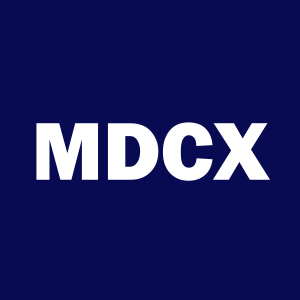Medicus Pharma Ltd. Announces Submission of Product Development Plan to the Food and Drug Administration (FDA) to Treat External Squamous Cell Carcinoma (SCC) in Horses
Rhea-AI Summary
Positive
- Received MUMS designation providing 7-year market exclusivity post-approval
- Targeting an untapped market opportunity worth approximately $250 million
- Previous Phase 1 human trials showed safety and efficacy with no serious adverse events
- Interim analysis of Phase 2 study shows promising 60% clinical clearance rate
- Expanding clinical trials internationally to Europe and UAE
Negative
- Product is still in early development phase for veterinary use
- Will require successful completion of clinical trials before potential approval
- Competition from existing treatment methods including surgery and chemotherapy
News Market Reaction 1 Alert
On the day this news was published, MDCX gained 4.35%, reflecting a moderate positive market reaction.
Data tracked by StockTitan Argus on the day of publication.
Company Is Advancing Use of Novel Doxorubicin-containing Microneedle Array (D-MNA) Patch in Veterinary Oncology as an Orphan Drug
Philadelphia, Pennsylvania--(Newsfile Corp. - June 9, 2025) - Medicus Pharma Ltd. (NASDAQ: MDCX) ("Medicus" or the "Company") is pleased to announce submission of a comprehensive product development plan to treat external squamous cell carcinoma (SCC) under Investigational New Animal Drug (INAD File No.013880).
The Company, in December 2024, received a Minor Use in Major Species Designation (MUMS) for its dissolvable Doxorubin-containing microneedle array (D-MNA) to treat external squamous cell carcinoma (SCC) in horses. The product development plan is designed to seek concurrence of the FDA under MUMS designation.
MUMS is a status similar to Orphan Drug status for human drugs. It entitles the Company to an extended 7-year period of exclusive marketing following approval or conditional approval, provided that the Company meets all requirements for maintaining the designation.
Doxorubicin-containing microneedle array (D-MNA) is a patent protected dissovable transdermal patch with cellulose based microneedle arrays that are tip-loaded with doxorubicin. After application, the microneedles function by penetrating the strateum corneum layer of the skin, create a temporary microchannel, penetrate the tumor, dissolve and release doxorubicin into the target tumor, and eradicate the cancer cells.
"In Veterinary Medicine, where there are only a handful of approved oncology drugs, we believe developing a non-invasive treatment for equine SCC represents an untapped and unmet market opportunity potentially in the range of
Squamous Cell Carcinoma (SCC) in Horses
SCC is a mucocutaneous skin tumor in horses, primarily affecting adult or aged horses with white or partially white coats. Breeds like Appaloosa, Belgian, American Paint, and Pinto are particularly susceptible. SCC often develops in areas with minimal pigmentation and sparse hair, notably around mucous membranes. More specifically, tumors are mainly seen around the eyes, lips, nose, anus, and external genitalia. The overall incidence of SCC is 2
Current treatment includes surgery to remove the largest mass, cryotherapy of the smaller mass, and local injection of a chemotherapy drug. In some cases, a topical chemotherapeutic drug will be prescribed in the form of drops (tumors near the eye) or cream (tumors in other parts of body). Additionally, some horses are put on an oral drug called piroxicam that may slow the return of the cancerous cells.
Product Development Plan
The clinical study, SKNJCT-004, is designed to be a randomized, double-blind, placebo-controlled (P-MNA), multi-center study enrolling up to 50 horses presenting with external SCC of the skin. The study will evaluate the efficacy of two dose levels of D-MNA compared to a placebo control. The horses will be randomized 1:1:1 to one of three groups: a placebo-controlled group receiving P-MNA, a low-dose group receiving 100μg of D-MNA, and a high-dose group receiving 200μg of D-MNA. The horses will be assessed for outcomes over six (6) months from index dose. The primary effectiveness variable will be a veterinarian's assessment for complete clinical response of the target tumor at day 90 according to RECIST.
The high-dose, 200μg D-MNA, proposed in the study is the maximum dose that was used in the Company's Phase 1 safety and tolerability human study (SKNJCT-001) completed in March 2021.
SKNJCT-001 met its primary objective of safety and tolerability. The investigational product, D-MNA, was well tolerated across all dose levels in all 13 participants enrolled in the study, with no dose-limiting toxicities (DLTs), or serious adverse events (SAEs). Furthermore, there were no systemic effects or clinically significant abnormal findings in laboratory parameters, vital signs, ECGs, and physical examinations. The study also describes the efficacy of the investigational product, D-MNA, with 6 participants experiencing complete responses. The complete response is defined as the disappearance of BCC histologically in the final excision at the end of study visit. The participants profile demonstrating complete responses was diverse, and all participants (6/6) had nodular subtype of BCC.
The Company also has SKNJCT-003 Phase 2 clinical study currently underway in nine (9) clinical sites across United States which commenced randomizing patients in August 2024. In March 2025 the Company also announced a positively trending interim analysis for SKNJCT-003 demonstrating more the
The Company also has a clinical design (SKNJCT-004) currently underway in United Arab Emirates (UAE). The study is expected to randomize 36 patients in four sites in UAE. Cleveland Clinic Abu Dhabi (CCAD) is the principal investigator, along with Sheikh Shakbout Medical City (SSMC), Burjeel Medical City (BMC), and American Hospital of Dubai (AHD). Insights Research Organization and Solutions (IROS), a UAE-based contract research organization, is coordinating the clinical study for the Company. IROS is a M42 portfolio company.
In April 2025, the Company announced entering into a binding letter of intent to acquire Antev Ltd. ("Antev"), a UK-based late clinical stage biotech company, developing Teverelix, a next generation GnRH antagonist, as first in market product for cardiovascular high-risk advanced prostate cancer patients and patients with first acute urinary retention relapse (AURr) episodes due to enlarged prostate.
For further information contact:
Carolyn Bonner, President
(610) 636-0184
cbonner@medicuspharma.com
Anna Baran-Djokovic, SVP Investor Relations
(305) 615-9162
adjokovic@medicuspharma.com
About Medicus Pharma Ltd:
Medicus Pharma Ltd. (NASDAQ: MDCX) is a biotech/life sciences company focused on accelerating the clinical development programs of novel and disruptive therapeutics assets.
SkinJect Inc. a wholly owned subsidiary of Medicus Pharma Ltd, is a development stage, life sciences company focused on commercializing novel, non-invasive treatment for basal cell skin cancer using patented dissolvable microneedle patch to deliver chemotherapeutic agent to eradicate tumors cells. The Company has completed a phase 1 safety & tolerability study (SKNJCT-001) in March of 2021, which met its primary objective of safety and tolerability; the study also describes the efficacy of the investigational product D-MNA, with six (6) participants experiencing complete response on histological examination of the resected lesion. The Company is currently conducting a randomized, controlled, double-blind, multicenter clinical study (SKNJCT-003) in United States and Europe. The Company has also commenced a randomized, controlled, double-blind, multicenter clinical study (SKNJCT-004) in UAE.
In April 2025, the Company also announced entering into a binding letter of intent to acquire Antev, a UK-based late clinical stage biotech company, developing Teverelix, a next generation GnRH antagonist, as first in market product for cardiovascular high-risk advanced prostate cancer patients and patients with first acute urinary retention relapse (AURr) episodes due to enlarged prostate. The transaction with Antev is subject to the completion of satisfactory due diligence by Medicus, negotiation of definitive agreements, obtaining applicable corporate, regulatory and other third-party approvals and the fulfillment of customary closing conditions. No assurances can be made that the parties will successfully negotiate and enter into a definitive agreement, or that the proposed transactions will be consummated on the terms or timeframe currently contemplated, or at all.
Cautionary Notice on Forward-Looking Statements
Certain information in this news release constitutes "forward-looking information" under applicable securities laws. "Forward-looking information" is defined as disclosure regarding possible events, conditions or financial performance that is based on assumptions about future economic conditions and courses of action and includes, without limitation, statements regarding its comprehensive product development plan to treat external SCC for horses, the commencement of its development plan, the market opportunity a non-invasive treatment for equine SCC and the Company's opportunity to develop, gain approval for and commercialize its product to meet such opportunity, the commencement of the SKNJCT-004 study and the potential results of and benefits of such study, the potential Antev transaction, including the entry into a definitive agreement in respect of the Antev transaction, the closing of the transaction or the timing thereof, the potential benefits of the Antev transaction, if consummated, including plans and expectations concerning, and future outcomes relating to, the development, advancement and commercialization of Teverelix, and the potential market opportunities related thereto, the results of the interim analysis, which may or may not correlate with the findings of the clinical study report that will be compiled following completion of the phase 2 study, the Company's plans and expectations concerning, and future outcomes relating to, the submission and advancement of the phase 2 clinical protocol, the randomization of patients and size of the study, the Company's intention to complete and submit an interim data analysis to the FDA and to request a Type C meeting and the timing thereof, the Company's aim to fast fast-track the clinical development program and convert the SKNJCT-003 exploratory clinical trial into a pivotal clinical trial, and approval from the FDA and the timing thereof. Forward-looking statements are often but not always, identified by the use of such terms as "may", "on track", "aim", "might", "will", "will likely result", "would", "should", "estimate", "plan", "project", "forecast", "intend", "expect", "anticipate", "believe", "seek", "continue", "target" or the negative and/or inverse of such terms or other similar expressions. These statements involve known and unknown risks, uncertainties and other factors, which may cause actual results, performance or achievements to differ materially from those expressed or implied by such statements, including those risk factors described in the Company's public filings on EDGAR and on SEDAR+, which may impact, among other things, the trading price and liquidity of the Company's common shares. Forward-looking statements contained in this news release are expressly qualified by this cautionary statement and reflect our expectations as of the date hereof and thus are subject to change thereafter. The Company disclaims any intention or obligation to update or revise any forward-looking statements, whether as a result of new information, future events or otherwise, except as required by law.
Readers are cautioned that the foregoing list is not exhaustive, and readers are encouraged to review the Company's long form prospectus accessible on the Company's profile on EDGAR at www.sec.gov and on SEDAR+ at www.sedarplus.ca . Readers are further cautioned not to place undue reliance on forward-looking statements as there can be no assurance that the plans, intentions or expectations upon which they are placed will occur. Such information, although considered reasonable by management at the time of preparation, may prove to be incorrect and actual results may differ materially from those anticipated.

To view the source version of this press release, please visit https://www.newsfilecorp.com/release/254845








